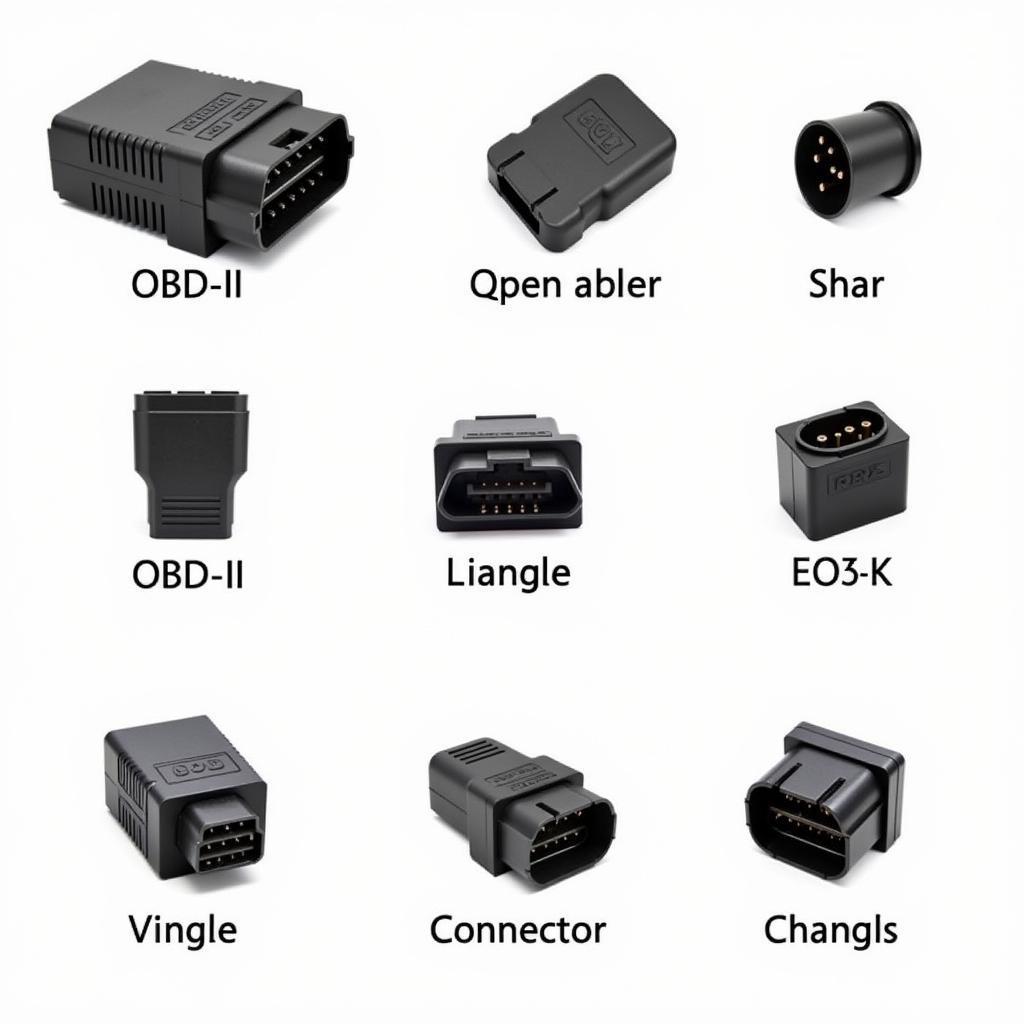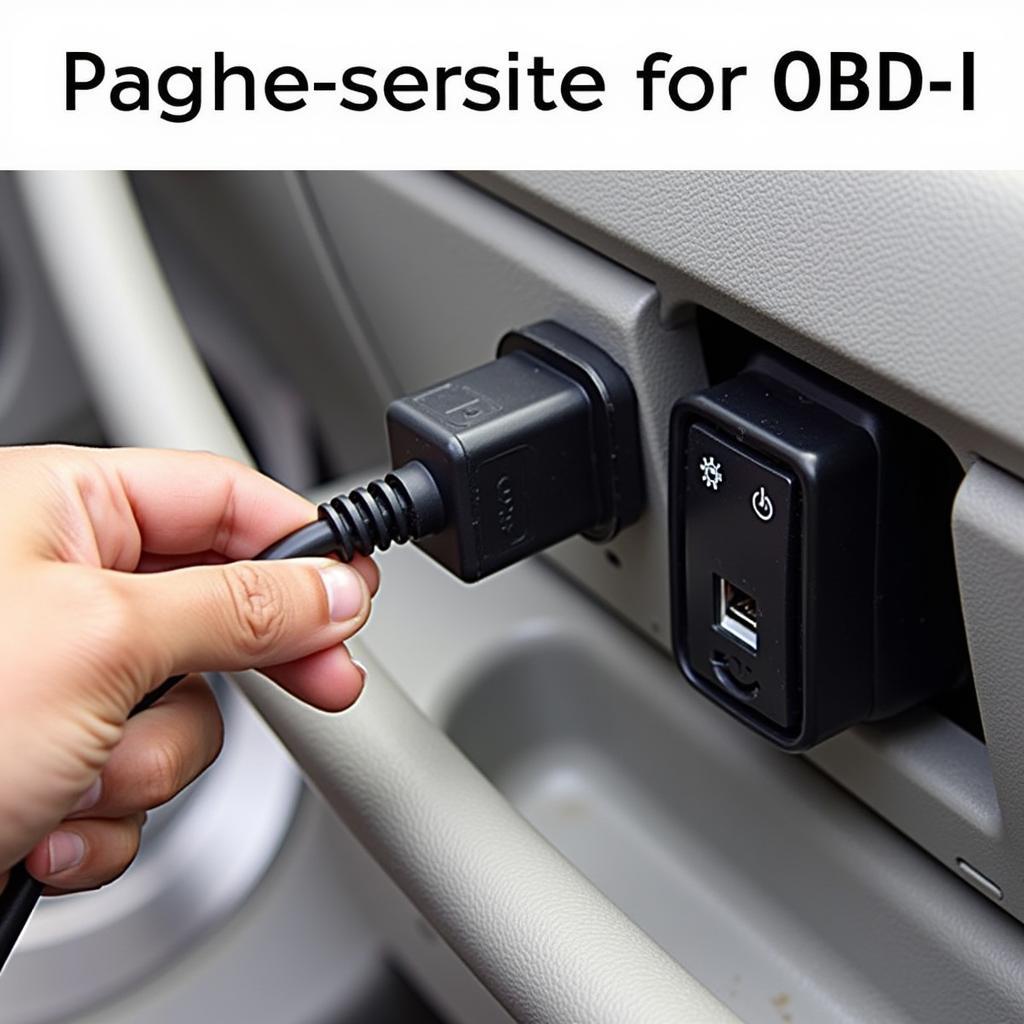As vehicle technology advances, so too do the tools used to diagnose and repair them. Modern vehicles rely heavily on complex electronic systems, making Car Diagnostic Tool Adapters indispensable for mechanics and car enthusiasts alike. These ingenious devices bridge the gap between your diagnostic tool and your car’s onboard computer, allowing for seamless communication and accurate data retrieval.
 Different Types of Car Diagnostic Tool Adapters
Different Types of Car Diagnostic Tool Adapters
Why Are Car Diagnostic Tool Adapters Important?
Simply put, without the correct adapter, your diagnostic tool is rendered useless. Each car model, and sometimes even specific model years, utilize different communication protocols and connector types. Adapters ensure that your diagnostic tool can “speak the same language” as your car’s computer.
Here’s why you might need a car diagnostic tool adapter:
- Vehicle Compatibility: Adapters ensure your diagnostic tool can connect to a wide range of vehicles, from different manufacturers to specific models.
- Protocol Conversion: Adapters translate the communication signals between the tool and the vehicle’s computer, enabling data exchange.
- Specialized Functions: Some adapters unlock advanced diagnostic functions or access manufacturer-specific systems within a vehicle.
Types of Car Diagnostic Tool Adapters
The world of car diagnostic tool adapters is vast, catering to a multitude of vehicle makes and models. Here are some common types:
1. OBD-II Adapters
The most common type, OBD-II adapters, connect to the standardized OBD-II port found in most gasoline vehicles manufactured after 1996 and diesel vehicles manufactured after 2008. These adapters are widely available and often compatible with various diagnostic tools.
 Connecting an OBD-II Adapter to a Vehicle’s Port
Connecting an OBD-II Adapter to a Vehicle’s Port
2. EOBD Adapters
Similar to OBD-II, EOBD (European On-Board Diagnostics) adapters are designed for vehicles sold in Europe. While they share similarities with OBD-II, they may have slight variations in connector design or supported protocols.
3. Manufacturer-Specific Adapters
For vehicles with proprietary diagnostic systems or older models that pre-date standardized protocols, manufacturer-specific adapters are essential. These adapters are tailored to a particular car brand or model, allowing access to specialized functions and data.
4. Wireless Adapters
Bluetooth and Wi-Fi-enabled adapters provide a cable-free diagnostic experience. These adapters connect your diagnostic tool wirelessly to the vehicle, allowing for greater flexibility and movement while working.
bluetooth smartphone car diagnostic tool
Choosing the Right Car Diagnostic Tool Adapter
Selecting the appropriate adapter depends on several factors:
- Vehicle Make and Model: Identify the specific make, model, and year of your vehicle to determine compatibility.
- Diagnostic Tool: Ensure the adapter is compatible with your chosen diagnostic tool, checking for supported protocols and connector types.
- Required Functions: Consider if you need access to basic or advanced diagnostic functions and choose an adapter that supports those requirements.
- Budget: Adapter prices can vary significantly based on functionality and brand. Determine your budget and explore options that align with your needs.
Common Uses of Car Diagnostic Tool Adapters
Car diagnostic tool adapters empower you to perform various tasks, including:
- Reading and Clearing Diagnostic Trouble Codes (DTCs): Identify and clear any fault codes stored in the vehicle’s computer, helping you pinpoint and resolve issues.
- Monitoring Live Data Streams: Observe real-time sensor readings, such as engine RPM, coolant temperature, and oxygen sensor data, to analyze vehicle performance and diagnose problems.
- Performing Actuator Tests: Activate components like fuel injectors, solenoids, or motors to verify their functionality and identify potential issues.
- Programming and Coding: Certain adapters allow for advanced functions like programming new keys, resetting service lights, or adjusting vehicle settings.
diagnostic software for toyota cars
Troubleshooting Common Adapter Issues
While car diagnostic tool adapters are generally reliable, occasional issues may arise. Here are a few troubleshooting tips:
- Connection Problems: Ensure the adapter is securely connected to both the vehicle’s diagnostic port and the diagnostic tool. Try cleaning the contacts of the adapter and the vehicle’s port.
- Software Compatibility: Verify that your diagnostic software is up-to-date and compatible with the chosen adapter. Outdated software may lead to communication errors.
- Damaged Adapter: Inspect the adapter for any physical damage to the connector or cable. If damage is present, replace the adapter.
- Vehicle-Specific Issues: Some vehicles have known compatibility issues with certain adapters or require specific software configurations. Consult your vehicle’s service manual or online forums for potential solutions.
Conclusion
Car diagnostic tool adapters are essential tools for anyone working with modern vehicles. They provide the vital link between your diagnostic tool and your car, unlocking a wealth of information about its health and performance. Understanding the different types of adapters, choosing the right one for your needs, and knowing how to troubleshoot common issues will ensure you have the right tool for the job.
Ready to dive deeper into the world of car diagnostics? Explore our comprehensive selection of car diagnostic for android tools and adapters.

Leave a Reply